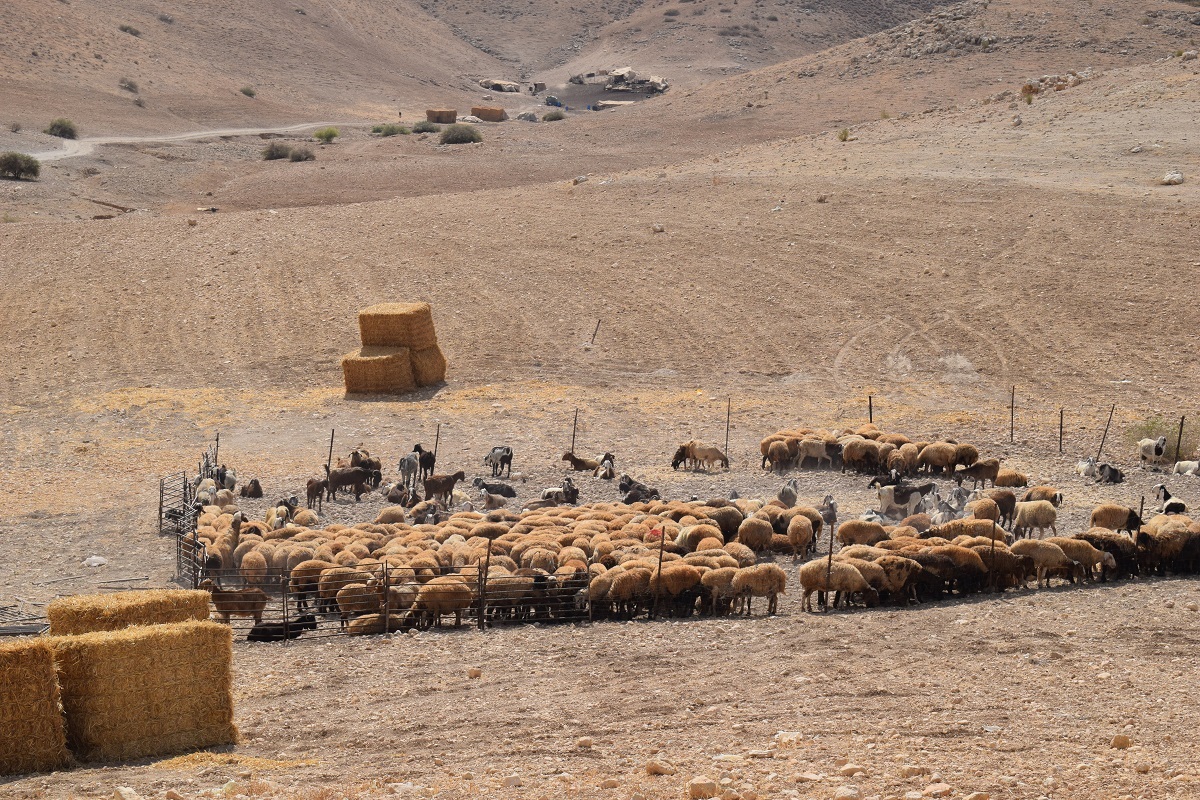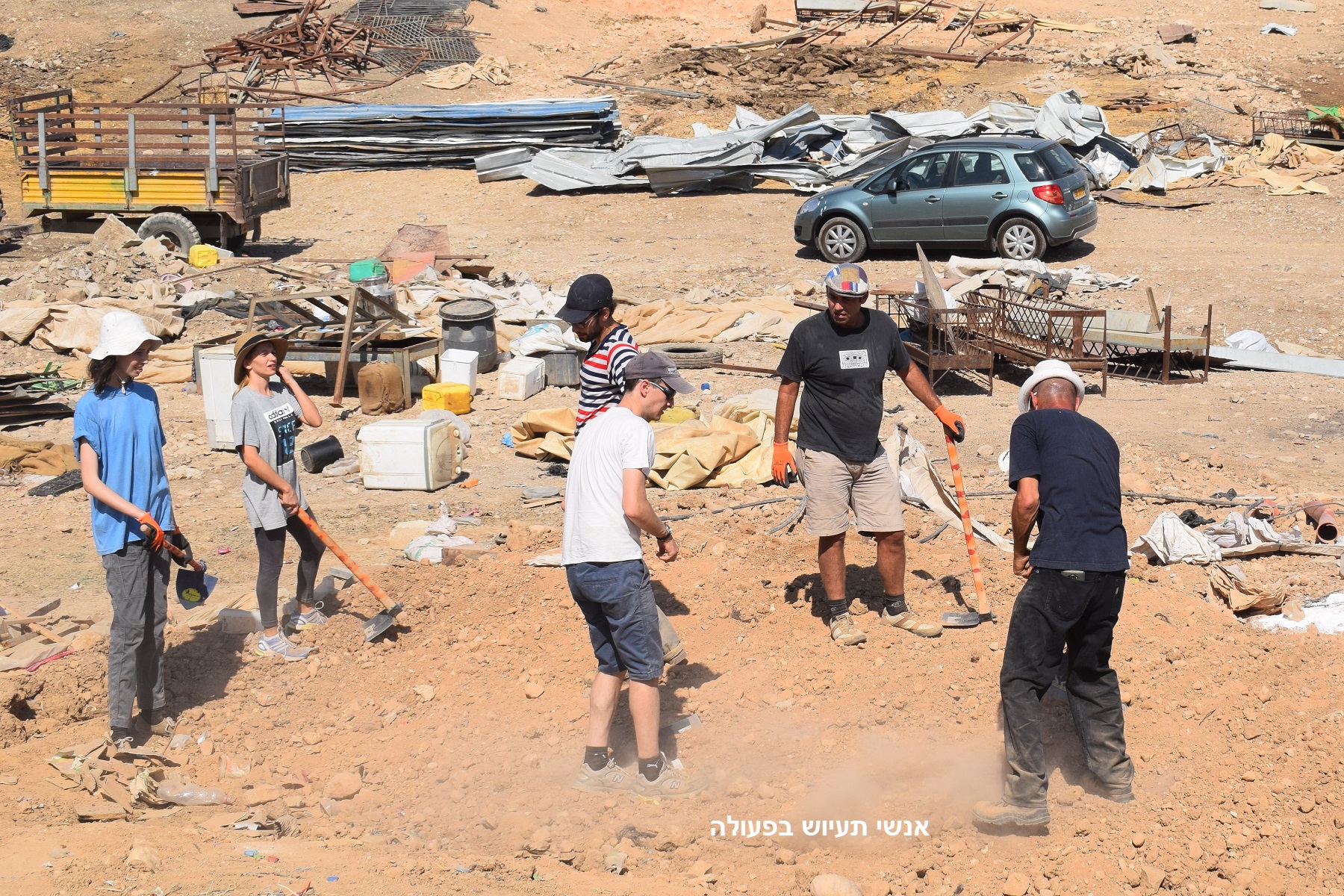The Palestinian Jordan Valley

Look at them, these Ta’ayush members! – untiring in the seething sun, enthusiastically building, well - not exactly building but preparing everything for the moment that will produce an interim order preventing demolition. They straighten metal rods, organize the remains of tents and connect them to larger sheets of material, and batter the tin sheets until these simply give in. The Palestinians build here and there, but only in cases where this is really a question of life and death. And there, a shade is already spread over the heads of the sheep, and a pile of tin plates already rises, and in a matter of days a new hamlet will appear ‘for the glory of Palestine’. Unlike previous demolitions, spirits are not crestfallen. People are having a hard time, very hard in fact. It is no simple matter to crowd 25 people in a single tent (that’s what is left after the demolition) and spend the entire day in the sun. But there’s a spirit of action, enthusiasm, hope. And much of it thanks to these fellows from Jerusalem and Tel Aviv who have stayed with the Palestinians night and day when the army came to intimidate and harass them. (Today the army did not show up). And now young women and men are raking the soil and flattening the area which the army literally mutilated. On Saturday they will be here again, along with Combatants for Peace, the Water Coalition, Machsomwatch and others. Palestinians from the area will also arrive to express their solidarity.

We visited Burhan – this is now birthing season and he has 12 new lambs. A week ago he was taking devoted care of a lamb born weak – he laid him on his own jeans and gave him milk every two hours. We were afraid the lamb was dying, it looked so very poorly. Today that lamb is already hopping around in the pen. When Burhan enters, all the lambs rush to him and crowd at his legs. They think he’s their mother…

His tin roof is full of holes. When the rains come, this roof will offer the sheep no real shelter. Last year he tried to replace it. The army came, wrought havoc inside the home (spilt sugar, flour and cheeses on the floor) and threatened to demolish it and the sheep pens unless brought back to their previous condition. They were. The interim order forbids him to change anything in the present situation. But how long can he last with the leaking roof? Ta’ayush members have offered to help him fix it, at least. Ashraf, his brother, has the same problem. I suppose everyone here does.
Makhoul inhabitants are denied water. So they must buy it where it is supplied (even if meagerly). At En Shibli water has run out and last month it was purchased at Bardala and transported in a water tanker – at great expense, but what options are there? A week ago, Mekorot (the Israel water company) shut off the sources of water at Bardala and the water tanker returned empty. For over two days humans and sheep both were left with no water. The Mekorot director claimed the Palestinians tap the water pipe illegally and damage it. Perhaps. It is only natural for them to do so under their dire circumstances.
I do believe, however, that because of this drought year water is lacking in the settlements as well. The water level in their swimming pools is lower, and in general there is less water. So Mekorot supplies them with more water at the expense of the villages that do get a certain supply, such as Bardala. Just to be clear: all the water here belongs originally to the Palestinians. In this case they originate from pumps inside the village of Bardala, wells that until 1967 served only Palestinians!
In Makhoul we heard that beyond the dirt and rock piles and the gates that arbitrarily separate them from the central West Bank hills, there is plenty of water. They could bring water from Atouf village, about 3 km. to the west. However, the gate that separates them from Atouf or Tamoun – Koghia Gate – has been closed for three years now, and a water tanker simply cannot get through. The answer provided by the Civil Administration
that arbitrarily separate them from the central West Bank hills, there is plenty of water. They could bring water from Atouf village, about 3 km. to the west. However, the gate that separates them from Atouf or Tamoun – Koghia Gate – has been closed for three years now, and a water tanker simply cannot get through. The answer provided by the Civil Administration : this is a firing zone and sometimes serves army maneuvers. For the Palestinians’ own good, we do not open this gate so no one will get hurt… In Arabic the Palestinians say this is kizabin – all lies. During maneuvers the very same gate remains open at least for a week, sometimes even 3 weeks, so that soldiers and tanks can move through freely. And that is the only time Palestinians do pass freely over to the West Bank hills.
: this is a firing zone and sometimes serves army maneuvers. For the Palestinians’ own good, we do not open this gate so no one will get hurt… In Arabic the Palestinians say this is kizabin – all lies. During maneuvers the very same gate remains open at least for a week, sometimes even 3 weeks, so that soldiers and tanks can move through freely. And that is the only time Palestinians do pass freely over to the West Bank hills.
A video will be posted separately by Nurit Popper, our gifted photographer.
All photos by Nurit Popper.


